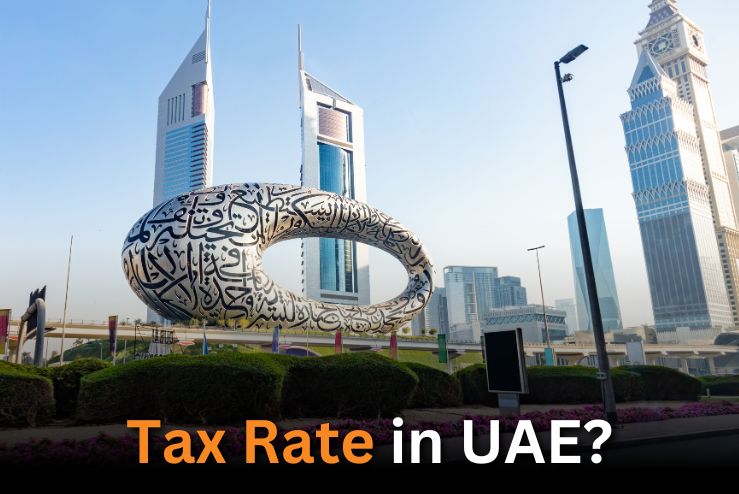The United Arab Emirates (UAE) is known for its low tax system, making it an attractive destination for businesses and individuals. The country does not impose personal income tax on most residents, except for workers in oil companies and foreign banks. However, businesses may need to pay corporate tax, import duties, and Value Added Tax (VAT).
This guide breaks down the tax rates in the UAE and how they apply to residents and businesses.
1. Personal Income Tax in the UAE
✅ No personal income tax for UAE residents and citizens.
✅ Only oil company employees and foreign bank workers pay income tax.
✅ No tax on salaries, investments, or rental income.
The UAE’s tax-free personal income policy attracts professionals, entrepreneurs, and investors worldwide.
2. Corporate Tax in the UAE
Most businesses in the UAE do not pay corporate tax, except for:
| Business Type | Corporate Tax Rate |
|---|---|
| Oil companies | 55% of net profit |
| Foreign banks | 20% of net profit |
| All other companies | 0% corporate tax |
✅ Free zones offer 100% tax exemptions for many businesses, making the UAE a top choice for startups and multinationals.
3. Import Duties in the UAE
Most goods entering the UAE are subject to a 5% import duty, but some products have higher rates:
| Product | Import Duty Rate |
|---|---|
| General goods | 5% |
| Tobacco | 100% |
| Alcohol | 50-100% |
| Pork products | 100% |
4. Value Added Tax (VAT) in the UAE
The UAE introduced VAT on January 1, 2018, to increase government revenue.
| Category | VAT Rate |
|---|---|
| Standard goods & services | 5% |
| Essential goods (e.g., medicine) | 0% |
| Free zones | 0% |
✅ Sectors like healthcare, education, and international transport are exempt from VAT, keeping costs lower in these essential industries.
5. How the UAE Earns Revenue Despite Low Taxes
Even with low tax rates, the UAE generates revenue from:
- Oil exports
- Corporate taxes on oil companies and banks
- VAT and import duties
- Tourism, trade, and business investments
This allows the government to fund world-class infrastructure, healthcare, and public services without heavily taxing individuals.
6. How UAE Taxes Compare Globally
The UAE has one of the lowest tax rates worldwide:
- Personal tax: 0% (vs. 20-50% in Europe and the US)
- Corporate tax: Only for oil and banking (vs. 15-30% in most countries)
- VAT: 5% (vs. 15-25% in many countries)
✅ The UAE’s low-tax system encourages investment, tourism, and economic growth.
Key Takeaways
✔ No personal income tax for residents except oil and banking employees.
✔ Only oil companies (55%) and foreign banks (20%) pay corporate tax.
✔ A low 5% VAT applies to most goods and services.
✔ Import duties are generally 5%, but higher for specific products like tobacco and alcohol.
✔ UAE’s low-tax policy attracts businesses, professionals, and investors.
Frequently Asked Questions (FAQs)
1. Is there personal income tax in the UAE?
No, the UAE does not tax individual income, except for workers in oil companies and foreign banks.
2. What is the corporate tax rate in the UAE?
- Oil companies pay 55% tax on profits.
- Foreign banks pay 20% tax on profits.
- All other businesses currently pay 0% corporate tax.
3. What is the VAT rate in the UAE?
VAT is 5% on most goods and services, but some essential sectors (like healthcare and education) are VAT-free.
4. Are there any special tax-free zones in the UAE?
Yes, the UAE has free zones where companies enjoy 0% corporate tax, 100% foreign ownership, and tax-free imports/exports.
5. What are the import duties in the UAE?
- Most goods: 5%
- Tobacco: 100%
- Alcohol: 50-100%
- Pork products: 100%
6. Do UAE residents need to file personal tax returns?
No, UAE residents and citizens do not need to file income tax returns.
7. Do UAE residents pay taxes on foreign income?
No, there are no taxes on foreign earnings or overseas investments.
8. Do I need to pay tax if I start a business in the UAE?
Most businesses do not pay corporate tax, except for oil companies and foreign banks.
9. Are property purchases taxed in the UAE?
No, there are no property taxes, capital gains taxes, or inheritance taxes in the UAE.
10. Are businesses in the tourism sector taxed?
Tourism businesses pay 5% VAT, but no direct taxes on profits.
Conclusion
The UAE’s low-tax system makes it a top destination for businesses and individuals. With zero personal income tax, low VAT, and tax-free zones, the country offers huge financial benefits to residents and investors.
📌 Whether you’re a professional, entrepreneur, or investor, the UAE’s tax-friendly policies provide financial freedom and business opportunities.

